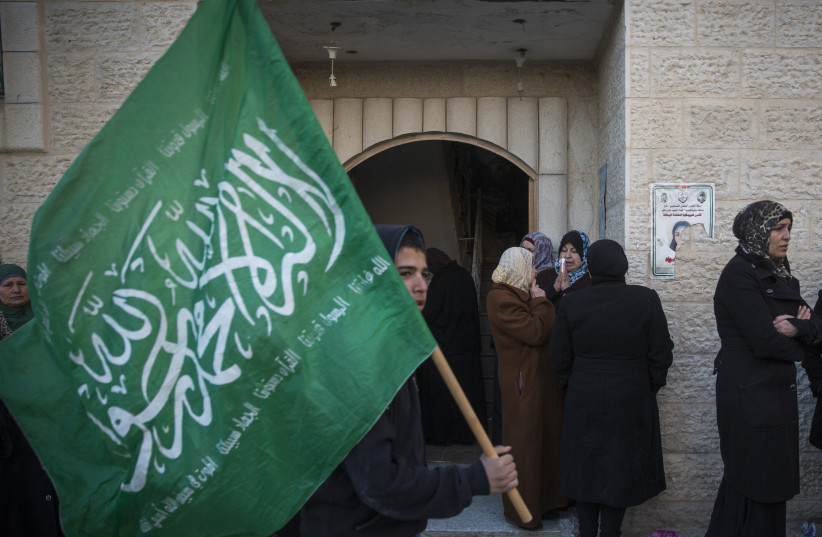A Hamas-affiliated list on Tuesday won the election for the student council at An-Najah University in Nablus in what is seen by Palestinians as a major blow to the ruling Fatah faction headed by Palestinian Authority President Mahmoud Abbas.
It was the second victory by a Hamas-affiliated group in student elections at a West Bank university in the past year.
In May 2022, supporters of Hamas at Bir Zeit University, north of Ramallah, scored a landslide victory by winning 28 of the student council’s 51 seats, as opposed to 18 for their rivals in Fatah. The next elections at Bir Zeit University are scheduled to take place next week amid expectations that the Hamas-affiliated list, Islamic Bloc, is slated to win again.
Anti-Palestinian Authority armed groups and sentiments emerge in Nablus
In the past year, Nablus saw the emergence of a number of armed groups such as Lions’ Den, Balata Battalion and Nablus Battalion. Some Palestinians in the city have criticized the PA for failing to order its security forces to confront Israeli troops during counterterrorism operations that resulted in the killing and arrest of scores of gunmen.
In September 2022, the city witnessed clashes between PA security forces and gunmen after the security forces arrested top Hamas member Musab Shtayyeh, who is also wanted by Israel. Shtayyeh remains in custody despite promises by the PA to release him.

According to the results of Tuesday’s elections at An-Najah University, the Palestinian Islamic Bloc, which is affiliated with Hamas, won 40 seats of the student council’s 81 seats, just beating the Fatah-affiliated list, The Martyrs’ Bloc, which came in second with 38 seats. A third list belonging to the PLO’s Popular Front for the Liberation of Palestine (PFLP) got only three seats.
The last elections at An-Najah were held in 2017, when Fatah supporters won 41 seats, while those affiliated with Hamas got 34.
Since then, tensions between Fatah and Hamas students prompted the administration to delay the elections. Additionally, Hamas supporters on campus accused both the Palestinian Authority security forces and the IDF of arresting several students affiliated with Hamas.
After Hamas seized control of the Gaza Strip in 2007, the PA banned the group’s supporters from contesting the student council elections at An-Najah University. In 2013, however, the Hamas-affiliated list on campus was permitted to participate in the vote, winning 33 seats. Then, the Fatah-affiliated student list won 43 seats.
The victory of the Hamas-affiliated list in Tuesday’s elections came despite unprecedented efforts and campaigns by Fatah leaders and activists in Nablus over the past few weeks. Senior Fatah officials, including the faction’s deputy chairman, Mahmoud al-Aloul, and the PA governor of Nablus, Ibrahim Ramadan, held several rallies in the city to urge students to vote for the Fatah-affiliated list.
The vote on Tuesday was held in the aftermath of the recent round of fighting between Israel and Palestinian Islamic Jihad (PIJ), the second largest armed group in the Gaza Strip after Hamas. The vote also came amid ongoing raids by Israeli security forces on Nablus, especially the Old City, and the surrounding refugee camps of Balata and Askar.
The victory of the Hamas-affiliated list in Tuesday’s student council elections came as a surprise to Fatah leaders in Nablus, a long-time traditional stronghold of the faction.
A veteran Fatah activist who was previously associated with the faction’s armed wing, al-Aqsa Martyrs Brigades, said the Fatah defeat was a “severe blow” to Mahmoud al-Aloul, who is considered a potential successor to Abbas.
“This is bad news for Aloul and all members of Fatah in Nablus,” the activist told The Jerusalem Post. “We lost the elections because many people hold Fatah responsible for all the bad things the Palestinian Authority does.”
“We lost the elections because many people hold Fatah responsible for all the bad things the Palestinian Authority does.”
Veteran Fatah activist
The activist also held the Palestinian security forces responsible for Fatah’s defeat due to their meddling in the internal affairs of the students. “Honestly, as a Fatah representative I was happy to see our faction lose because this might serve as a lesson for the future,” he said. “The people, including the students, are fed up with the corruption and lies of Fatah.”
The activist told the Post that internal bickering among Fatah leaders in Nablus was another reason why the faction lost the elections. “I believe dozens of Fatah students voted for Hamas to express their anger and frustration with the PA and Fatah leadership.”
How did Hamas react?
Hamas leaders welcomed the results of the An-Najah University elections and said they are an indication that most Palestinians support the “path of resistance” against Israel.
In a statement issued in the Gaza Strip, said the “great victory reconfirms that all Palestinians are united behind the option of resistance.”
Nasser Eddin al-Shaer, a Hamas-affiliated academic from Nablus and a former PA minister of education, also welcomed the results of the elections at An-Najah University. He expressed hope that Tuesday’s vote would serve as a prelude for Palestinian general elections.
In 2021, Abbas called off parliamentary and presidential elections that were supposed to take place later that year on the pretext that Israel had refused to allow the vote to take place in Jerusalem. But Palestinian political analysts believe the real reason behind the decision to call off the elections was Abbas’s fear that Fatah would lose due to internal divisions and disputes.
